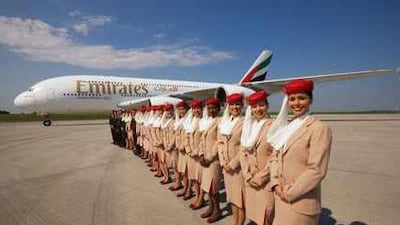The "mother of Emirates Airline" has just turned 50. DNATA, or the Dubai National Air Travel Agency, was set up in 1959 and 26 years later helped provide the personnel and systems for reservations, departure control and IT to give Emirates an extra boost, and earn its maternal nickname.
Over those years, the company grew into such a diversified provider of airport and travel services that when Gary Chapman, the president of DNATA and of Emirates Group Services, started in 1989, DNATA was also called "the airline without aircraft". "It was effectively an airline," Mr Chapman says. "It was the sole ground handler at the airport, it had all the departure control activity, it did everything. It was the agent for nearly every airline in Dubai, it just didn't have aeroplanes."
DNATA still does not have any aeroplanes but it does have the ability to consistently generate cash. Between its aircraft and cargo-handling units, its aviation IT products and its travel services and reservations businesses, the company gathered revenues of Dh3.16 billion (US$860 million) in its last fiscal year, up 24 per cent from the previous year. Profits were up 66 per cent to Dh507m, providing the kind of robust returns so welcome in the worst economic downturn for 70 years.
Mr Chapman paints a modest picture of the aviation services firm: "If I wanted to talk us down I could call us a grubby little handler." But this would belie DNATA's global reach. The company is gradually expanding beyond Dubai, based on Mr Chapman's goals to become "not the biggest but just the best, and invest in places with a reasonable financial return". That list now includes baggage and cargo handling at 17 airports in seven countries in Europe, Asia and Australia. It has been able to reap profits where others failed, such as in Singapore, where its global rival Swissport pulled out after losing more than $33m in three years.
Its travel services division is also spread out, from across the GCC to the UK, and even includes Najm Travel, an agency in Kabul. DNATA dates back to the late 1950s when the then Ruler of Dubai, Sheikh Rashid bin Saeed, decided to nationalise the air-ticketing industry to raise funds for an airport. Until that time tickets were sold in the various souks of Dubai and Sharjah, where the closest airfield was located. But the Emiri decree meant that tickets issued within Dubai would have to be cleared through a new entity in the hope of raising the Dh733,000 needed for an airport.
DNATA soon became an indispensable tool for airlines flying into Dubai, helping to arrange the tickets and protect baggage from a worrying trend of disappearing. From its beginnings in a small stand in the Bur Dubai souk, DNATA now has 10,000 employees, with nearly a third of them working abroad. Its 50th anniversary demonstrates DNATA's longevity and validates its business model, Mr Chapman says.
"We have people working for us for the last 35, 40 years," he says. "I'm forever signing certificates for people who have been here for 20 years. I think it is a demonstration of a business that has been very successful." One of the biggest factors in DNATA's success is its monopoly in handling at Dubai Airport. Airport operations far outweigh DNATA's other divisions, bringing in 48 per cent of revenues last year. And as the only handling firm it has benefited from the airport's extraordinary growth over the years to its current position as the fifth-largest international airport in the world.
Dubai International Airport has largely gone against the trend in the downturn, recording growing traffic figures as all of its global rivals suffered declines. Last year, DNATA handled a record 244,000 movements at Dubai International. And next year the airport is forecasting another 13.6 per cent growth, auguring more good times for the flight services company. At least one European airline has complained that it is paying too much for DNATA's services but Mr Chapman says other airports charge more.
"Our charges are incredibly competitive in the region," he says. "India is 50 per cent higher at least, and when you go to places in Europe it can be five to six times higher." The firm still wants to grow into more international markets but it has taken a cautious approach so far. "We're looking," Mr Chapman says. The company tries to avoid airports in the region that have many handlers, "which are so competitive that no one makes a reasonable return to invest in equipment, safety and their people", he says. "That leads you to a mature market and there aren't very many opportunities."
In the US, many airport concessions are run by local concerns that freeze out new competition. "It's almost a mafia-type approach to how things are done," Mr Chapman says. "You won't crack that." In Europe, poor work practices are such a concern that he believes it could be too hard for a newcomer to instil a new culture. DNATA also faces challenges in other areas of its business, particularly in travel services where airlines have moved to a commission-free approach.
It has focused on corporate customers, which are willing to pay to receive what Mr Chapman calls a total travel-management solution. And while DNATA may not be the cheapest, it delivers value, he says. "We've had some situations where corporates decide on price and go with the competitor, and come back in six months to us," he says. It has also had its fair share of innovations. After decades of creating its own IT systems, it has helped it create products that are now being sold to airports and other airlines.
One of its products is Calogi, an online platform allowing air cargo operators to negotiate and sell products and services to each other. Next year it will be marketed internationally, just one of several initiatives the company has to help it keep growing. @Email:igale@thenational.ae

